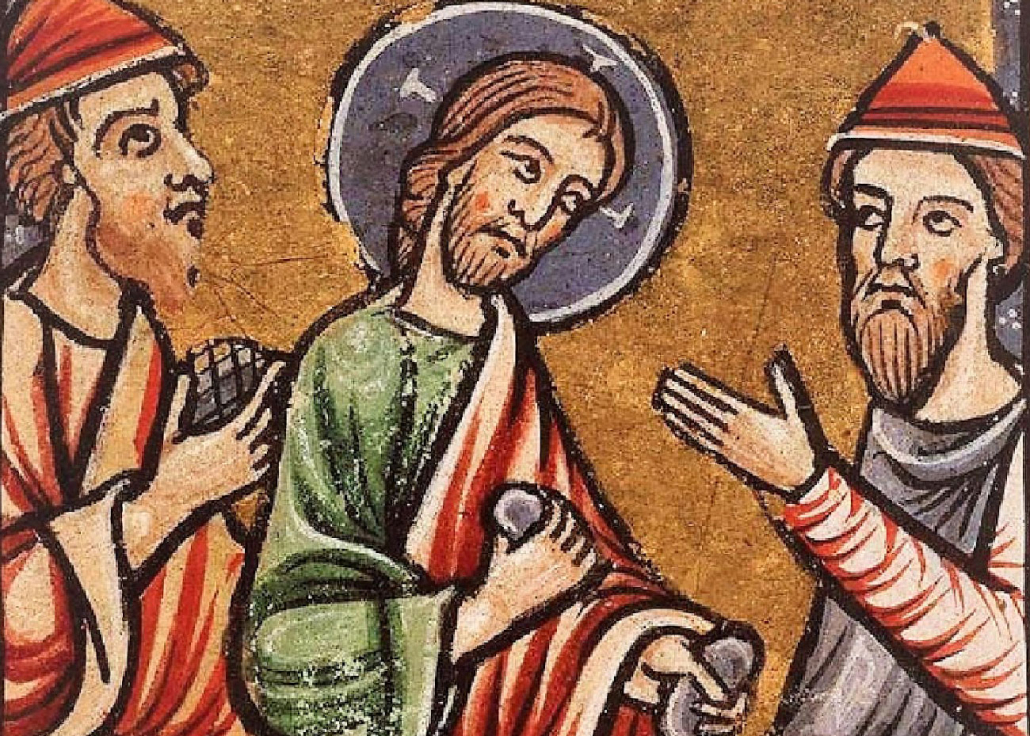Image: ‘Christ at Emmaus’ (detail), c. 1190, Picture Bible, St Omer Abbey.
‘Becoming believers’
Andrew Collis
Easter 3, Year A
Luke 24:13-35
Luke 24 (the “Road to Emmaus” and other stories) is structured like a traditional liturgy: gathering, journey, meeting Christ who interprets the scriptures in relation to Wisdom, then breaks the bread, then sends disciples out into the world.
The risen Christ disappears to reappear … to bring peace amid further conversation, sharing of food and drink, blessing.
The text, it would seem, emerges in a liturgical context, in the context of worship – communal prayers and readings, songs, rituals. Believers at worship – people who tell the truth about what they have experienced.
According to Louis-Marie Chauvet, our gospel is a story about us, about faith – our becoming believers.
Faith is made possible within a worshipping community (let’s say within the circular setting of these pews) and within the broader setting of the Spirit in the world (let’s remember to keep our doors open, lest we’re tempted to confine the Spirit’s activity to this or any other church).
Faith is made possible in and through our assent to the loss of a direct line to Christ/Sophia. Responsible believers, mature in their capacities for both mourning and hoping, accept that they do not see, touch, find or prove Jesus without reference to what happens within a worshipping community.
Believers see, touch, find and prove Jesus not by sitting alone, not by wishing the world to one side, certainly not by abandoning fellow travellers on the road (to Emmaus, Alexandria or Waterloo), but in the most concrete commitments to Christian living – ecological, historical, political, relational, liturgical.
Believers receive new selves and lives in at least three ways: in and through the Scriptures (symbolised by the pulpit and open Bible); in and through the Sacraments of Baptism and Eucharist (symbolised by the font and altar-table; water, wine and bread); in and through the call to Ethical relationships (we bow to the image of God in one another).
Believers come to appreciate the danger of over-emphasising one or other of these three ways – grasping at one or other of these three ways to faith.
An over-emphasis on the Scriptures fails to discern the Word from the words – and produces a biblical fundamentalism. An over-emphasis on the Sacraments fails to discern Grace from the means of grace – and produces a magical superstition …
All temptations to over-emphasis are “necrophilic” says Chauvet – characterised, that is, by desire for death (seeking the corpse of Jesus rather than the risen Christ) – and have also to do with the desire to control a living and liberating divine presence.
The third danger, perhaps the most ecumenical and perhaps the most modern, entails an over-emphasis on Ethics which produces an ideological hardness of heart or an oppressive moralism. Responsible believers acknowledge that their best efforts to relate justly and kindly to neighbours/strangers are precisely that – their own (cultural and sinful) best efforts.
The very presence of others – wounded, lost in wonder, love and praise – serves to remind us of all we’ve yet to learn when it comes to justice and kindness.
As we maintain this place and these practices, we are blessed – seeking God in Christ/Wisdom as we read the Scriptures according to a pattern of suffering-and-glory, as we break the common loaf and share the out-poured wine, and as we travel together and share our stories with a view to courageous mission. Amen.




